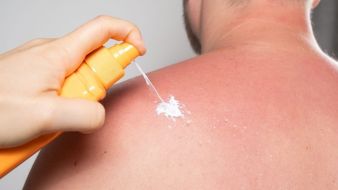Everyday activities like walking up the stairs or playing with children could help lower the risk of heart attack, stroke and even premature death, new research suggests.
The experts found that although short bouts of incidental activity are good for you, the how long you do them for, and how vigorously makes a difference.
The findings may make physical activity much more accessible to people who are unwilling or unable to take part in structured exercise, researchers say.
They found that the longer the bouts of activity, the better, regardless of total activity levels.
The large majority (97 per cent) of this everyday physical activity, like walking to the bus stop or household chores, was made up in bouts lasting less than 10 minutes.

In a group of people who said they did not take part in exercise or sport, short bouts of less than 10 minutes at a moderate to vigorous intensity were associated with a steep decrease in heart attack and stroke, and death by any cause.
According to the findings, moving consistently for at least one to three minutes was linked to significantly more benefit (29 per cent lower) than very short bouts of movement that lasted less than one minute.
Senior author Professor Emmanuel Stamatakis from the University of Sydney’s Charles Perkins Centre, in Australia, said: “From walking up the stairs to speedily mopping the floors, in recent years we’ve come to understand that it is not just structured exercise that is good for our health, but we know very little about how these short bouts of incidental activity translate to health benefits.”
He added: “The take-home message here is any type of activity is good for your health, but the more effort you put into those daily tasks and the longer you keep up that energy, the more benefits you are likely to reap.
“If you are huffing and puffing and unable to hold a conversation for some of that time you have hit the sweet spot.”
Lead author Dr Matthew Ahmadi said: “The idea of accruing short bouts of moderate to vigorous activity through daily living activities makes physical activity much more accessible to people who are unwilling or unable to take part in structured exercise. But as we see in this data, the length and the vigour people put into these incidental activities matters.”
The risk of all-cause death and major cardiovascular events (heart attack or stroke) was 29-44 per cent lower for activity periods of five minutes to less than 10 minutes, than bouts of less than one minute.
The study, published in The Lancet Public Health, also found that the higher the amount of vigorous activity in each bout the better.
People who huffed and puffed for at least 15% of the activity period (10 seconds per minute) saw the greatest benefit. Bouts of less than one minute were also associated with benefits if the above 15% vigorous activity rule was applied, researchers found.
The researchers used data from wrist devices worn by 25,241 people aged 42 to 78, in the UK Biobank database, and artificial intelligence to analyse the seven-day physical activity patterns in people who said they did not exercise.
The study linked these physical activity patterns with health records, following people for close to eight years to identify how length and intensity of physical activity bouts were linked to health status.
Dr Ahmadi added: “This study suggests people could potentially reduce their risk of major cardiac events by engaging in daily living activities of at least moderate intensity where they are ideally moving continuously for at least one to three minutes at a time.
“In fact, it appears that this can have comparable health benefits to longer bouts lasting five to 10 minutes.”







